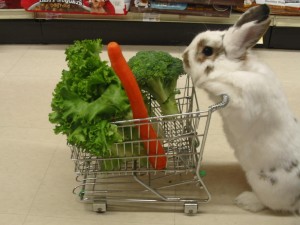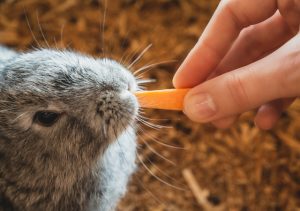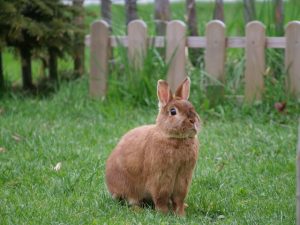
Broccoli is known to be rich in vitamins, minerals and dietary fiber. It also contains antioxidants and protective phytochemicals. Broccoli is loaded vitamin C and other vitamins like A, K, B6 and E. Important minerals such as calcium, phosphorus, potassium, magnesium are also found in broccoli. With all these nutrients, broccoli is recognized to have strong anti-cancer properties. Without a doubt, including this vegetable in human diets is quite healthful.
Can I Give My Rabbit Broccoli? It is not recommended
Although eating broccoli is good for humans, it is not recommended for rabbits. Like other cruciferous vegetables, broccoli is known to cause gas. If you wish to feed your rabbit some broccoli, it is advisable to give him the leaves only as the leaves are less likely to cause gas than the florets. Some rabbits may be less or more sensitive to broccoli than others.
You can feed your rabbit a small amount of broccoli and observe how he reacts. If your rabbit gets gas easily, then it is not recommended to give him broccoli and all other crucifers again. But if he seems fine with it, then you can feed him broccoli but still rarely and in moderation. You should know your rabbit's individual responses to any kind of food.
If your rabbit is not too sensitive to broccoli, it is still best not to give him crucifers more than one at a time. Aside from broccoli, crucifers also include the following: Horseradish, cress, mustard greens, kale, cabbages, Brussels sprout, kohlrabi greens, cauliflower, turnip greens, rutabaga greens, arugula, radish greens, and daikon greens.
If ever you notice signs of gas in your rabbit after you give him broccoli, you should immediately administer first aid treatment. If there’s no improvement after three to four hours, then you should bring your rabbit to the veterinarian. If the gas goes untreated for a long time, it could lead to Gastrointestinal (GI) Stasis.
GI Stasis is a very serious and rather common health issue in pet rabbits. It is potentially deadly as it slows down or stops completely the digestive system. This will bring about bad bacteria buildup in the intestines. Eventually, the rabbit will lack the motivation to eat or drink.
Here are some common signs of gas in rabbits: Loud stomach noises, swollen, hard belly, curling up into a crunched-up position and lack of interest in eating or playing.
When your rabbit shows signs of gas after eating broccoli you may give him a belly massage as first aid. However, be very gentle and press firmly into the stomach to try to break up the gas bubbles. You may also rub in circles and work the gas toward the anus.
Also, always encourage your rabbit to drink water as dehydration will only make the problem worse. It is also helpful if you can make your pet to move around as exercise can likewise aid in breaking up the gas bubbles.
Remember that not only broccoli can bring about gas in your rabbit. Even starchy root vegetables and fruits, if fed to excess, could lead to similar problem.
The best diet for you bunny should consist mainly of fresh hay and grass. Such foods are high in natural fiber and calcium so they are good for your pet. Feeding your rabbit quality pellets is also important, particularly for young bunnies. Pellet foods can also provide the essential vitamins and minerals he needs.
However, look for rabbit pellets that don’t contain too much protein and grain. Many brands in the market today are formulated this way. Feeding you pet such foods will lead to bloating. His urine may also smell like ammonia. Choose rabbit pellets that are soy free and has very little or no grain at all.
Another important consideration in choosing the right rabbit food is the size. Rabbit pellets should be of the proper size as well. Pellets that are too small are usually made from fine ground ingredients, which would most likely cause digestive problems.
Feeding a rabbit should be simple. As long as his diet is tailored towards meeting his nutritional needs, he will stay active and healthy. Rabbits tend to gain weight rapidly so it is important to keep a balanced diet. You may be tempted to feed your beloved pet extra treats once in a while. That’s fine on condition that it is done in moderation.
As a pet owner, it’s your responsibility to know what and what not to food feed your rabbit. To ensure a happy and fit bunny, always do some research or ask your veterinarian for healthy rabbit diets.





